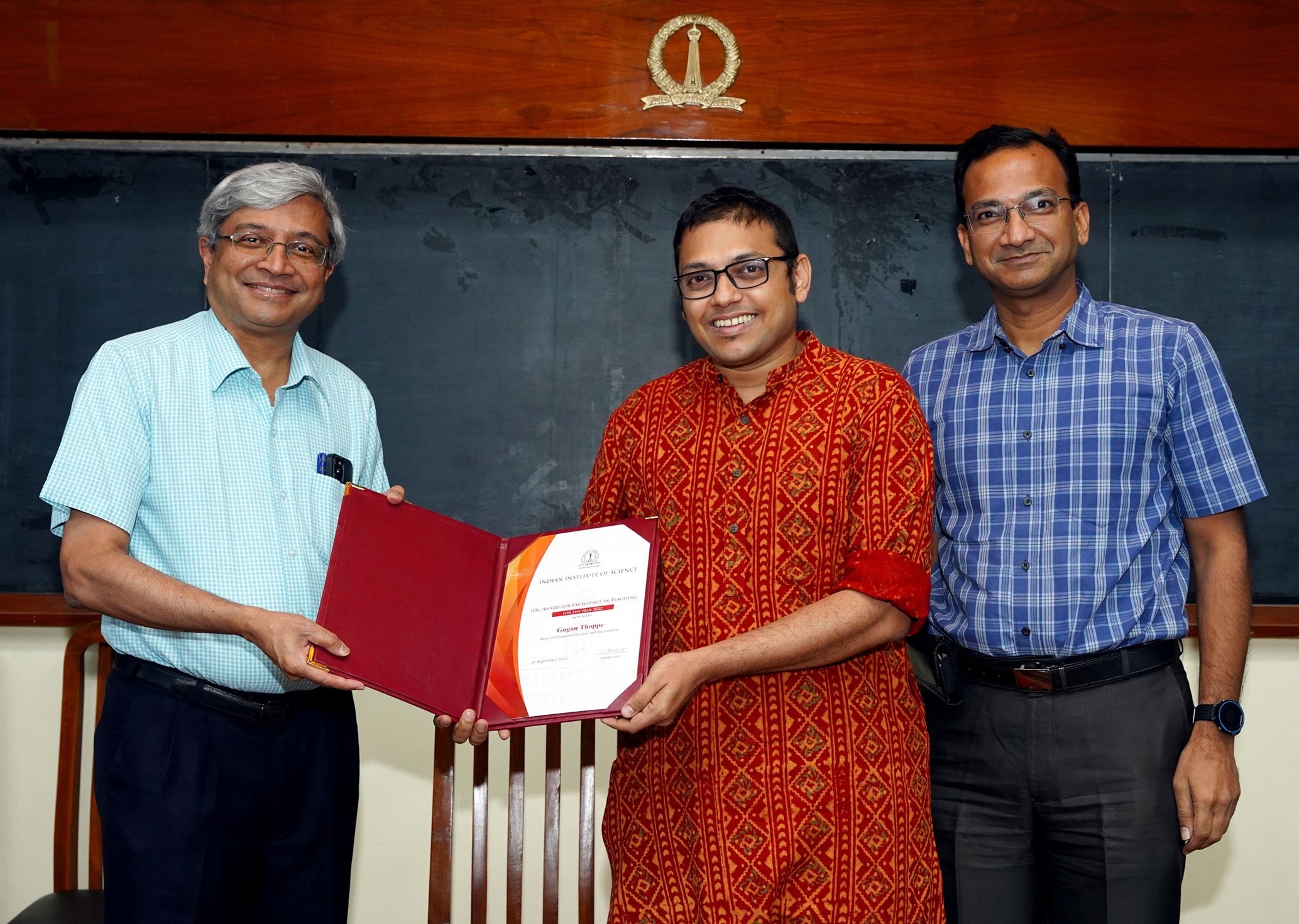
On 5 September 2022—Teacher’s Day—Gugan Thoppe received the ‘IISc Award for Excellence in Teaching’ from the Indian Institute of Science (IISc). He is an Assistant Professor in the Department of Computer Science and Automation, and is one of six faculty members who received these awards.
On the occasion of Teacher’s Day, we asked Gugan and eight other star teachers to speak about their roles and experiences as teachers at IISc. These are their views.
 Gugan Thoppe: Steve Jobs once said that ‘The most powerful person in the world is the storyteller. The storyteller sets the vision, values, and agenda of an entire generation that is to come”. I agree with this and believe the role of a teacher should simply be that of a great storyteller! Separately, tackling research problems often puts one through severe emotional turmoil. Therefore, teachers must be living examples of how one navigates this maze of uncertainty.
Gugan Thoppe: Steve Jobs once said that ‘The most powerful person in the world is the storyteller. The storyteller sets the vision, values, and agenda of an entire generation that is to come”. I agree with this and believe the role of a teacher should simply be that of a great storyteller! Separately, tackling research problems often puts one through severe emotional turmoil. Therefore, teachers must be living examples of how one navigates this maze of uncertainty.
 Komondoor V Raghavan: A teacher’s primary role is clearly to impart knowledge via interactive teaching and discussion. The teacher can enable the students to understand the complexity of the topic by asking questions, by discussing, by solving problems. A teacher should aspire to learn new knowledge and clarity from the questions and discussions of the students, and use this to improve their teaching to subsequent batches of students. Discovering new and evolving topics in the area and introducing them to students is also an important responsibility of teachers.
Komondoor V Raghavan: A teacher’s primary role is clearly to impart knowledge via interactive teaching and discussion. The teacher can enable the students to understand the complexity of the topic by asking questions, by discussing, by solving problems. A teacher should aspire to learn new knowledge and clarity from the questions and discussions of the students, and use this to improve their teaching to subsequent batches of students. Discovering new and evolving topics in the area and introducing them to students is also an important responsibility of teachers.
 Chandra Sekhar Seelamantula: Teaching is by far the best means of recharging yourself intellectually by staying in touch with the subject through regular interactions with bright, innovative, and talented students. Teaching is also an important profession in which strong capacity building is needed in the country on a high priority basis. Teaching must go beyond mere information transmission. The primary role of the teacher is to mentor and train students to evolve a structured style of thinking clearly, through questioning and logical reasoning. Deductive reasoning approaches that actively involve and engage the students in the classroom are far more efficient and effective for imparting knowledge and have a lasting impact than a monologue style delivery of content.
Chandra Sekhar Seelamantula: Teaching is by far the best means of recharging yourself intellectually by staying in touch with the subject through regular interactions with bright, innovative, and talented students. Teaching is also an important profession in which strong capacity building is needed in the country on a high priority basis. Teaching must go beyond mere information transmission. The primary role of the teacher is to mentor and train students to evolve a structured style of thinking clearly, through questioning and logical reasoning. Deductive reasoning approaches that actively involve and engage the students in the classroom are far more efficient and effective for imparting knowledge and have a lasting impact than a monologue style delivery of content.
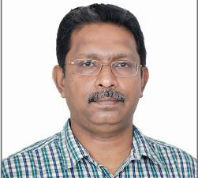
Kuruvilla Varghese: The role of a teacher is to inspire and transform the students. A good teacher opens the mind of the students to the breadth and depth of the subject. The teacher must have mastery of the subject matter to be able to accomplish this. A teacher is like a musician, rendering a difficult song beautifully, enriching the listener’s mind. A bright student challenges the teacher to climb higher, and a weak student makes the teacher more humane. The students feel comfortable approaching and sharing their anxieties and worries with a ‘Good Teacher’.
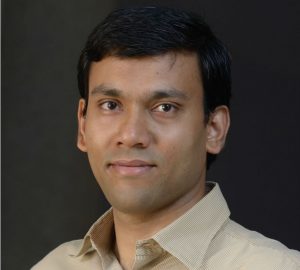 Prasanta Kumar Ghosh: A teacher teaches topics of a subject to the students. More than just teaching the materials related to a topic, the role of a teacher lies in imparting the concept behind a topic. More importantly, it is the connection among different topics that helps give a student a comprehensive learning experience and a teacher plays an important role there.
Prasanta Kumar Ghosh: A teacher teaches topics of a subject to the students. More than just teaching the materials related to a topic, the role of a teacher lies in imparting the concept behind a topic. More importantly, it is the connection among different topics that helps give a student a comprehensive learning experience and a teacher plays an important role there.
 Arindam Khan: Academia provides an unique opportunity to interact with young and vibrant minds, and share our accumulated knowledge. Being a facilitator in this transfer of human knowledge is always rewarding. Teaching is a creative and impactful endeavour. Looking back on my own experience as a student, I recognize the great impact that my teachers had on my life and personality.
Arindam Khan: Academia provides an unique opportunity to interact with young and vibrant minds, and share our accumulated knowledge. Being a facilitator in this transfer of human knowledge is always rewarding. Teaching is a creative and impactful endeavour. Looking back on my own experience as a student, I recognize the great impact that my teachers had on my life and personality.
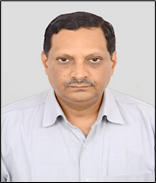
T Venkata Prabhakar: The role of a teacher is to inspire the student by innovating tools and methods to enhance interest. A lecture or a laboratory session that ends with something counterintuitive is food for thought.
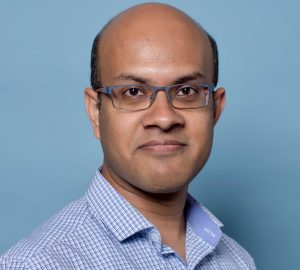 Sundeep Prabhakar Chepuri: At IISc, we have the pleasure of teaching some of the best students with an appetite for solving challenging problems. The most effective way of training students of such calibre to help them make the most of their potential is by inculcating an attitude of asking the right questions, pushing them for a deeper understanding, and providing them with an enjoyable learning experience.
Sundeep Prabhakar Chepuri: At IISc, we have the pleasure of teaching some of the best students with an appetite for solving challenging problems. The most effective way of training students of such calibre to help them make the most of their potential is by inculcating an attitude of asking the right questions, pushing them for a deeper understanding, and providing them with an enjoyable learning experience.

Rajiv Soundararajan: I see the role of a teacher as a facilitator for self-learning or self-realization. The teacher also provides one template for self-learning by illustrating thought processes that are useful. The teacher is a role model in several ways, particularly in ethical aspects. A teacher also inspires curiosity towards new ideas, encourages critical questioning, removes fear of exploration, and encourages perseverance in tasks.
Gugan Thoppe: I feel privileged to be able to teach at IISc for two reasons. First, I have a lot of freedom to decide on the courses to teach. Second, my classes are filled with some of the best students in India and the world: they are self-motivated and have a zeal to excel. To be honest, these students are capable of learning things on their own. Hence, in my classes, I have primarily focussed on (i) summarising the ever-exploding literature, (ii) explaining the significant open problems in the field, and (iii) helping my students develop a principled approach for solving the same. These classroom interactions have enriched my understanding of my own field of research and has given me several interesting questions to ponder upon.
Komondoor V Raghavan: IISc Bengaluru is an incredible place to be a teacher. The classes are small and lively. The students come by choice to learn advanced topics, and are very inquisitive and questioning by nature. The questions they ask and the observations they make frequently give the teacher new insights that are not even found in academic publications and books. The resources developed by students, such as programming tools, often end up useful to subsequent batches of students or to the community as a whole. Teachers feel empowered and useful the minute they stand on the dais to teach, and this is something very few other professions can confer.
Chandra Sekhar Seelamantula: I have had the good fortune of teaching courses at IISc in addition to conducting research. In fact, teaching has only strengthened my research productivity. I have been teaching ever since I joined IISc’s Department of Electrical Engineering as a faculty member in 2009, at least two courses per year and sometimes even three with co-teaching. Prior to that, as a postdoctoral fellow at École Polytechnique Fédérale de Lausanne, or as a PhD student at IISc’s Electrical Communication Engineering Department, I never let go of any opportunity to teach or render teaching assistance.
Teaching in IISc has always been a great pleasure largely because of the high calibre of students you get to interact with. Every time I taught a class, I learnt something new about the topic, derived new insights, or learnt a new way of presenting the content. The experience has been intellectually stimulating, immensely rewarding and satisfying. This is also a profession where both parties—the teacher and the taught—get mutually benefitted. The sense of fulfilment you get when you see a sparkle in the eyes of the students who have understood and appreciated your classes is unmatched.
I owe a lot to my own teachers at various stages in my education, and to all the brilliant students and colleagues I have interacted with and learnt from, over the past several years.
Kuruvilla Varghese: Since courses in IISc are predominantly for post-graduates, the courses deal with advanced topics. The academic freedom in IISc enables the instructor to keep the courses updated, with minimum administrative approvals. Since the students are selected after proper screening, there will be good percentage of bright students, which enables a higher standard for courses. One lacuna often found is the bit weak communication skills of students, as they are from diverse backgrounds.
Prasanta Kumar Ghosh: It is a teacher who can inculcate the habit of asking questions that paves the way to a successful learning. As a teacher, I have exercised these aspects by designing teaching methodologies, assignments, and examinations such that they together help students overcome their learning gaps and these, I found, keep them attentive and engaged in a class.
Arindam Khan: As a teacher, I learn from my students as much as I teach them (if not more). Teaching also helps me in my research as it provides an opportunity to rediscover elementary topics with a refined understanding.
T Venkata Prabhakar: My experience as a teacher is the joy of constantly learning from students. The mutual respect gained from each other is permanent.
Sundeep Prabhakar Chepuri: Nowadays, it is easy to access the latest research breakthroughs or some of the best courses around the globe. However, access to the content alone is not enough, and that’s where faculty play a crucial role. At IISc, we have the pleasure of teaching some of the best students with an appetite for solving challenging problems. The most effective way of training students of such calibre to help them make the most of their potential is by inculcating an attitude of asking the right questions, pushing them for a deeper understanding, and providing them with an enjoyable learning experience.
Rajiv Soundararajan: To be able to orient the thought processes of students in specialised areas through courses and research mentorship has been most satisfying and rewarding. The transformation of students through this journey has been remarkable and unbelievable to witness! The interactions and arguments with students have only benefited me making the student–teacher relationship reversible.
